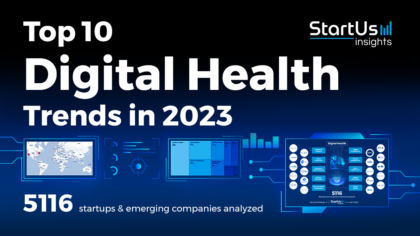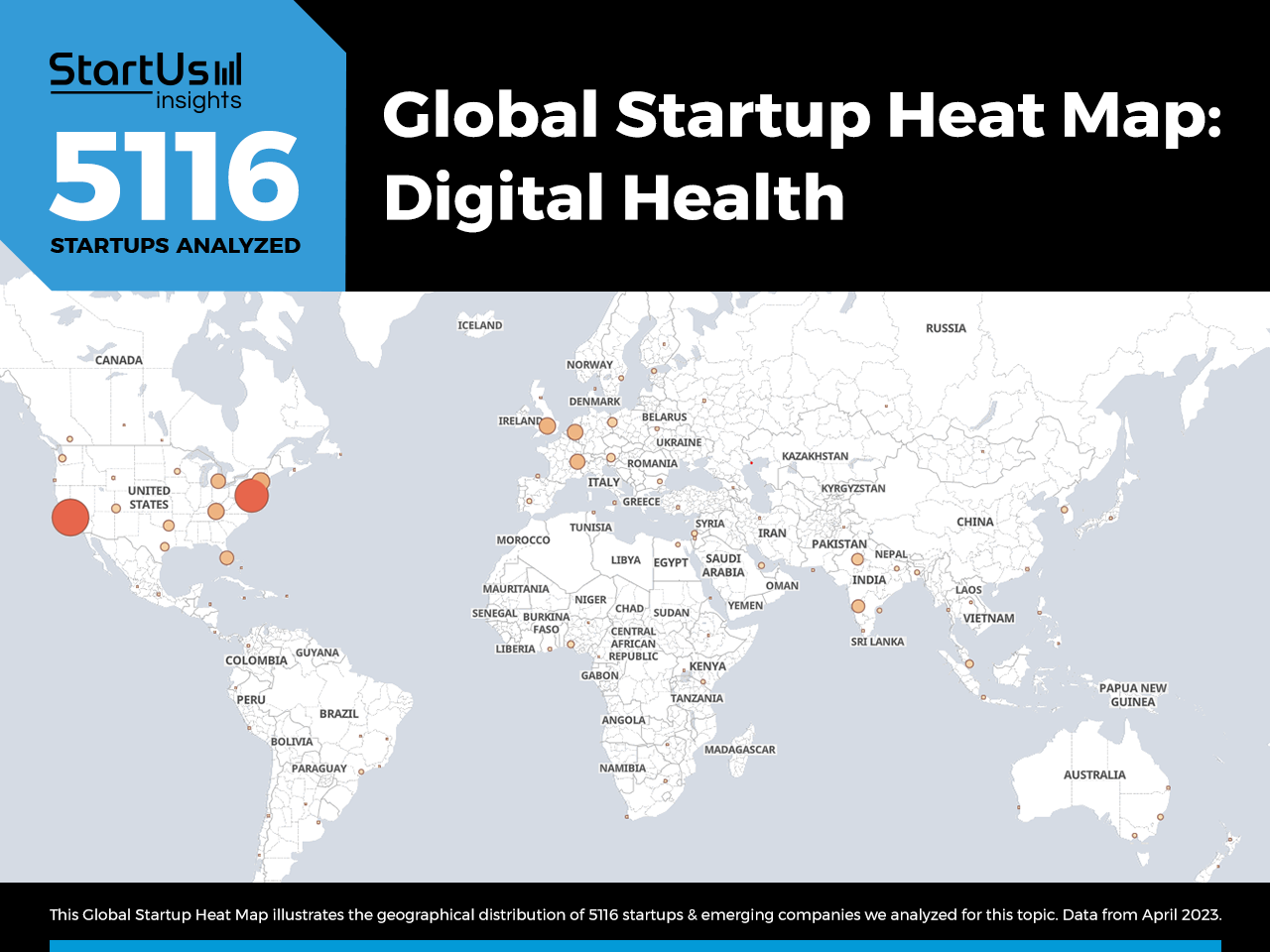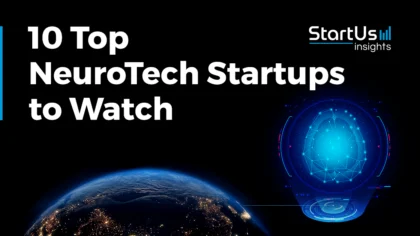Accelerate Productivity in 2025
Reignite Growth Despite the Global Slowdown
Digital health refers to the use of digital tools and data to improve healthcare delivery and medical device development. It encompasses a wide range of technologies, including mobile health (mHealth) apps, electronic health records (EHRs), telemedicine, wearable devices, and more. The use of cloud computing and artificial intelligence (AI) enables the analysis of large massive health-related datasets in real-time. This provides medical professionals with timely insights that drive treatment decisions.
Moreover, the rapid digitalization of healthcare increases the deployment of electronic medical records (EMRs) and health information exchange (HIE). There is also a growing interest in remote patient management and home healthcare services due to the convenience they offer. This report focuses on the top 10 digital health trends based on our analysis of 5116 startups and scaleups. Read more to explore how they advance healthcare and impact patient outcomes.
What are the Top Digital Health Trends (2025)?
- Healthcare Analytics
- Cloud Healthcare
- Electronic Health Records
- Medical Wearables
- Remote Patient Monitoring
- Digital Therapeutics
- Patient Engagement
- Home Health Care
- Digital Biomarkers
- Mobile Health
Methodology: How We Created the Digital Health Trend Report
For our trend reports, we leverage our proprietary StartUs Insights Discovery Platform, covering 5M+ global startups, 20K technologies & trends plus 150M+ patents, news articles, and market reports.
Creating a report involves approximately 40 hours of analysis. We evaluate our own startup data and complement these insights with external research, including industry reports, news articles, and market analyses. This process enables us to identify the most impactful and innovative trends in the digital health industry.
For each trend, we select two exemplary startups that meet the following criteria:
- Relevance: Their product, technology, or solution aligns with the trend.
- Founding Year: Established between 2020 and 2025.
- Company Size: A maximum of 200 employees.
- Location: Specific geographic considerations.
This approach ensures our reports provide reliable, actionable insights into the digital health industry innovation ecosystem while highlighting startups driving technological advancements in the industry.
Innovation Map outlines the Top 10 Digital Health Trends & 20 Promising Startups
For this in-depth research on the Top Digital Health Trends & Startups, we analyzed a sample of 5116 global startups & scaleups. This data-driven research provides innovation intelligence that helps you improve strategic decision-making by giving you an overview of emerging technologies in the healthcare industry. In the Digital Health Innovation Map, you get a comprehensive overview of the innovation trends & startups that impact your company.

Tree Map reveals the Impact of the Top 10 Digital Health Trends
Digital health startups and scaleups are developing cloud-based healthcare solutions to improve the accessibility and scalability of medical services. Electronic medical records provide healthcare professionals (HCPs) with easy access to patient medical history, including diagnoses, treatments, and medications.
The healthcare industry also witnesses an increase in solutions such as digital biomarkers, mhealth, and wearable health monitoring. Digital therapeutics (DTx) is increasingly used in conjunction with traditional medical treatments, or on a self-guided basis. Moreover, advances in healthcare analytics deliver accurate clinical decision support for physicians.

Global Startup Heat Map covers 5116 Digital Health Startups & Scaleups
The Global Startup Heat Map showcases the distribution of 5110+ exemplary startups and scaleups analyzed using the StartUs Insights Discovery Platform. It highlights high startup activity in the US, the UK, and India. From these, 20 promising startups are featured below, selected based on factors like founding year, location, and funding.
Want to Explore Digital Health Innovations & Trends?
Top 10 Digital Health Trends in 2025
1. Healthcare Analytics
The healthcare industry generates a vast amount of data from various sources, including EHRs, medical imaging, wearables, mobile health apps, and more. Suitable analysis of this data improves the overall efficiency of healthcare systems. Healthcare analytics also provides clinicians with real-time data to make informed decisions on disease diagnosis.
By using machine learning algorithms to identify patterns in large datasets, predictive analytics identifies patients who are at risk of developing certain conditions, such as diabetes or heart disease. This allows for early intervention to prevent or manage such conditions. Healthcare analytics solutions also facilitate public health management. Further, healthcare analytics enables hospitals to optimize their operations, such as scheduling appointments, staff management, and resource allocation.
The global healthcare analytics market is set to reach USD 133.19 billion by 2029, growing at a compound annual growth rate (CAGR) of 24.3%.
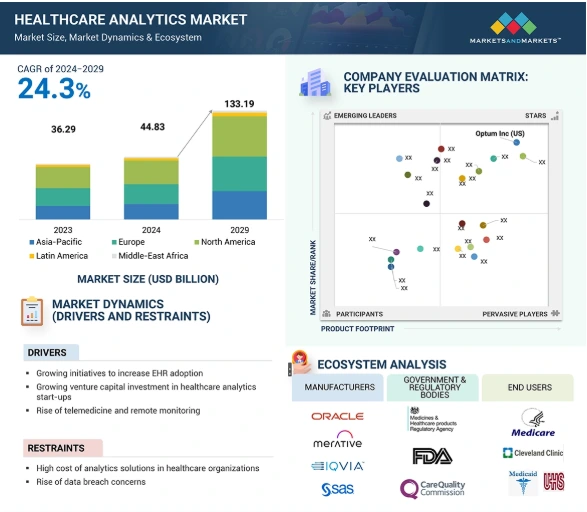
Credit: Markets and Markets
Health Analytics Connect builds a Healthcare Data Coding and Analyzing Platforms
US-based startup Health Analytics Connect provides data analytics solutions for the healthcare industry. Their products include Report Generator, Outcomes Analyzer, and Analytic Recipes, which streamline reporting, quantify program effectiveness, and provide strategic insights. These solutions leverage AI and advanced analytics to integrate diverse data sources, automate report generation, and deliver customizable, actionable insights.
Applicants of the solution include uncovering cost drivers, identifying high-risk individuals, evaluating population health initiatives, addressing healthcare disparities. It is suitable for health plans, self-funded employers, brokers, consultants, and healthcare providers who use these solutions to make data-driven decisions, optimize resource allocation, and improve patient outcomes.
NXGEN Medical Services creates a Medical Data Analysis Tool
Swiss startup NXGEN Medical Services offers a cloud-based data analysis platform, NXGEN Medico, for healthcare professionals. The platform includes features for marketing, trend analysis, research and development, and other functions.
It combines AI, macroeconomics, and population data with medical data to predict customer demand over time, facilitating planning and resource allocation. The startup’s platform helps medical professionals to match supply and demand by identifying locations that are more probable to require healthcare services.
2. Cloud Healthcare
Cloud computing in healthcare allows clinicians and medical staff to manage large volumes of patient data, such as EHRs or medical imaging data, more efficiently and without expensive infrastructure. It also ensures easy access to patient healthcare information whenever needed.
This improves the speed and efficiency of care and enables collaboration between providers in real time. Cloud-based solutions also provide a secure backup for healthcare data in the event of a natural disaster or other emergencies. This ensures that critical patient data is not lost or destroyed. Moreover, the use of cloud computing facilitates the delivery of telemedicine services, improving care access for patients in remote areas.
The global healthcare cloud computing market is set to reach USD 120.6 billion in 2029 growing at a CAGR of 17.5%.
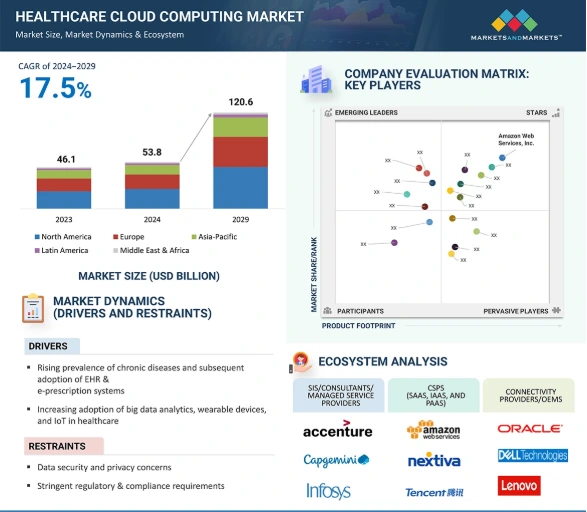
Credit: Markets and Markets
Aurabox enables Medical Image Storage & Viewing
Australian startup Aurabox creates a cloud-based medical imaging storage and viewing platform. It enables doctors to access a patient’s complete imaging history from anywhere. The platform makes it easy for doctors to see, analyze, as well as show a patient’s disease progression over time.
It also offers a side-by-side image comparison for better diagnosis. This way, the startup encourages greater patient engagement and improves collaborative care.
Miter Health develops Home Care Management Software
US-based startup Miter Health makes cloud-based management software for home healthcare. It allows home healthcare agencies to create patient records using pre-built features based on medical protocols, thereby reducing non-compliance risk. The software thus ensures treatment protocols are followed and secures sensitive patient information. Further, it streamlines both skilled and non-skilled home care service workflows by delivering real-time patient health information.
3. Electronic Health Records
Electronic health records have evolved significantly over the years, with a focus on improving the accuracy, accessibility, and usability of patient data. EHRs provide healthcare professionals with real-time access to a patient’s complete medical history, improving the diagnosis, treatment, and monitoring of health conditions.
Advances in EHR focus on improving interoperability, making it easier for healthcare providers to access and share patient data across different systems. Startups are also incorporating AI algorithms into EHR solutions for more accurate diagnosis and treatment recommendations. Further, voice recognition-powered EHR systems allow clinicians to document patient data using natural language processing (NLP). This saves time and reduces the risk of errors associated with manual data entry.
The global electronic health records (EHR) market size is projected to grow from USD 31.00 billion in 2024 to USD 46.63 billion by 2032, exhibiting a CAGR of 5.2%.
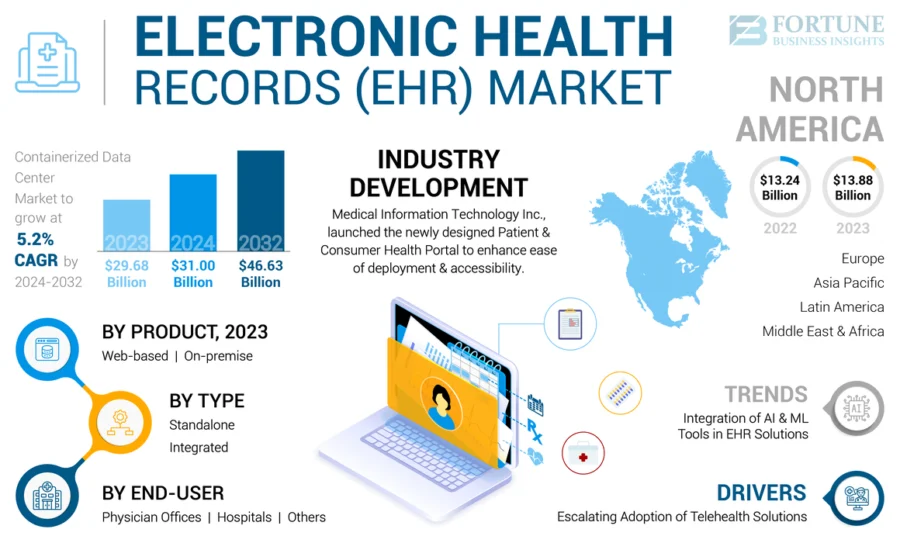
Credit: Fortune Business Insights
CloudPital offers a Healthcare Information System
Saudi Arabian startup CloudPital provides EHR software that integrates clinical workflows and patient engagement in one platform. The software simplifies appointment scheduling across different healthcare providers for seamless operations. It automates medical billing via financial reporting, claim checks, electronic payment posting, and more.
This enables faster and error-free billing. Further, the software helps medical professionals analyze patient experience to identify areas of improvement. The platform also ensures the availability of up-to-date patient information by integrating and digitalizing all types of medical data.
Z-waka offers EHR Software
Myanmar-based startup Z-waka develops EHR software for clinics in low-resource settings. The software facilitates compliance of medical practices with global healthcare standards in order to ensure safe workflows.
It creates e-prescriptions to reduce manual errors and also integrates different types of medical data. This ensures the availability of complete patient data in one place for better diagnosis and treatment options.
4. Medical Wearables
Wearables are becoming increasingly popular in the field of digital health as they offer a convenient and non-invasive way to monitor a range of patient health parameters. Medical wearables, like fitness bands, track calories burned, heart rate, sleep patterns, and physical activity. Among the most popular wearable devices are smartwatches, which allow patients to track various health metrics and receive notifications.
Startups also develop smart clothing that utilizes integrated sensors to track fitness metrics. There are also wearable health monitors, which track vital signs and alert users in case of any abnormalities. These solutions are especially suitable for people with chronic illnesses. Such devices allow medical professionals to intervene before a patient’s condition worsens significantly.
Nearly a quarter of patients with mood disorders needed less inpatient care due to their wearable devices connected to platforms like PatientsLikeMe.
The global wearable medical devices market is set to reach USD 33.37 billion in 2025 at a CAGR of 21.8%.
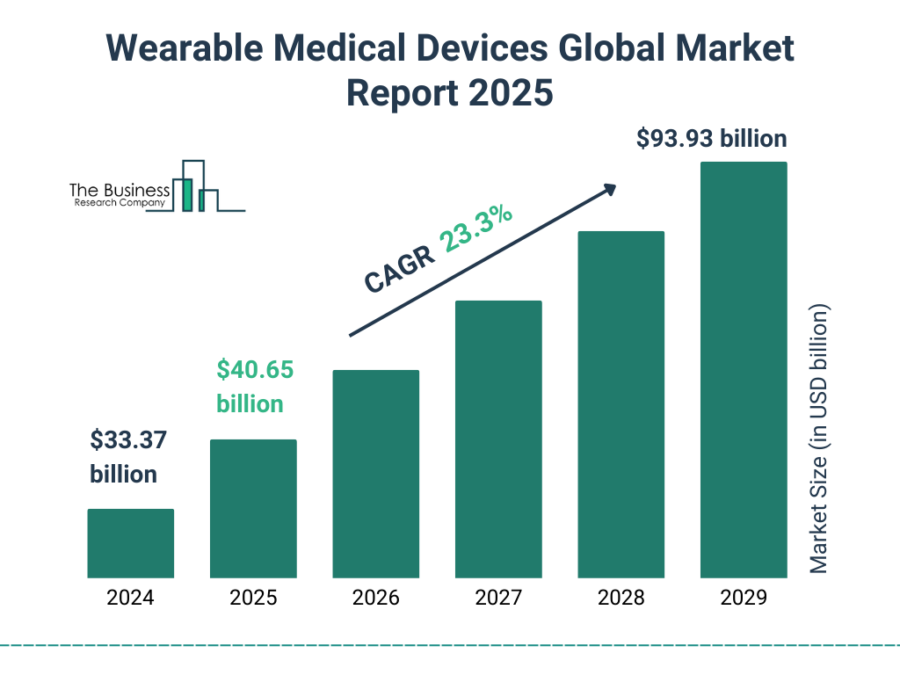
Credit: The Business Research Company
Nuanic builds a Stress Monitoring Rings
Finnish startup Nuanic developed the Nuanic Ring, a solution for stress management. This wearable device utilizes advanced electrodermal activity (EDA) measurement technology to provide real-time stress monitoring. The ring works by continuously collecting EDA data, which is then transmitted via bluetooth to the Nuanic mobile app, translating the information into an easy-to-understand stress score.
Users monitor their stress levels, receive personalized insights, and take proactive steps to manage their mental well-being. Features like water resistance and extended battery life make the Nuanic Ring a long lasting wearable.
InHandPlus advances Medication Management
South Korean startup InHandPlus designs a smartwatch and AI-based digital platform for medication management. The smartwatch collects patient data and its AI analyzes this data. The insights from the analysis, such as the medicines that patients take and the time of consumption, are made available to patients, doctors, and caregivers.
5. Remote Patient Monitoring
Remote patient monitoring allows healthcare providers to monitor patients’ health status without physical visits to healthcare facilities. It improves access to healthcare services, particularly for individuals who live in remote areas or have limited mobility. Also, patients are more actively involved in monitoring their own health using RPM.
The convenience of receiving health consultations at home contributes to an increased level of patient satisfaction. Further, remote monitoring reduces the need for hospitalization by allowing healthcare providers to address health issues before they become severe while reducing healthcare costs.
The global remote patient monitoring market is estimated to grow from USD 9.4 billion in 2025 to USD 88.0 billion in 2035, at a CAGR of 25% during the forecast period.
Fitpeo offers Remote Patient Monitoring
US-based startup FitPeo builds a platform for remote monitoring that addresses the challenges of episodic care approaches. The platform works by enabling remote monitoring of patients, allowing for continuous care and data collection outside of traditional clinical settings.
It is suitable for chronic and post-acute care management, as well as wellness programs, creating both clinical and financial benefits for healthcare providers. It is suitable for diverse health organizations, including hospitals, clinics, and care facilities, who leverage the platform to deliver more effective and efficient patient care.
Access Telehealth digitalizes Disease Management
US-based startup Access Telehealth offers HIPAA-compliant software and hardware monitoring chronic patients. The software enables health professionals to achieve care goals via patient engagement, training, adherence, and timely alerts.
Additionally, the startup offers medical devices to monitor the vitals of patients like glucose level, heart rate, temperature, and more. The data collected from these devices is analyzed to generate interactive virtual care reports. Moreover, the startup offers a teleconsultation solution for personalized and accurate monitoring of patient conditions.

6. Digital Therapeutics
Digital therapeutics is a relatively new form of medical treatment that utilizes digital technologies, such as software, wearable devices, and other digital platforms, to provide evidence-based interventions. These are intended to prevent, manage, or treat medical conditions. DTx is tailored to the individual needs of each patient and thus results in better treatment outcomes.
It also provides support for weight management, sleep disorders, chronic diseases, and other health-related issues. Moreover, DTx is accessible from anywhere, making it convenient for patients to receive treatment without physical consultations. It also allows healthcare professionals to monitor patients in real-time, which leads to the early detection of medical issues.
The digital therapeutics market is grow to USD 30.04 billion in 2029 at a CAGR of 28.6%.
ATX Therapeutics facilitates Chronic Condition Management
US-based startup ATX Therapeutics creates digital therapeutics solutions for chronic condition management such as cancer, heart disease, and chronic obstructive pulmonary disease (COPD). It allows users to reach their health goals through evidence-based behavioral intervention programs. This ensures personalized patient care based on their health history. The startup also ensures that patients and caregivers receive progress updates on their goals and outcomes to ensure treatment adherence and better health.
Tesu Health facilitates Digital Therapeutics
Turkish startup Tesu Health offers prescription digital therapeutics for the management of chronic metabolic diseases. The startup’s evidence-based software offers personalized management of specific medical conditions by taking into account factors such as genetic makeup, lifestyle, and medical history to develop customized treatment plans. This way, the startup’s solution improves patient outcomes and satisfaction.
7. Patient Engagement
Digital health promotes the active participation of patients through the use of digital technologies such as mobile health apps, wearables, and patient portals. These digital tools offer real-time access to health information, including test results, medication lists, and treatment plans. Solutions like AI-powered chatbots help patients navigate through the healthcare system and answer common questions.
Patients utilize digital tools to communicate with doctors, schedule appointments, or receive reminders for medication refills. When patients are engaged, they are more likely to adhere to treatment plans, reducing the need for hospitalization or emergency care. Startups also deploy technologies like virtual reality (VR) to aid patients manage pain, anxiety, and other symptoms via immersive distraction techniques.
The patient engagement solutions market is set to reach USD 51.45 billion by 2029 at a CAGR of 18.6%.
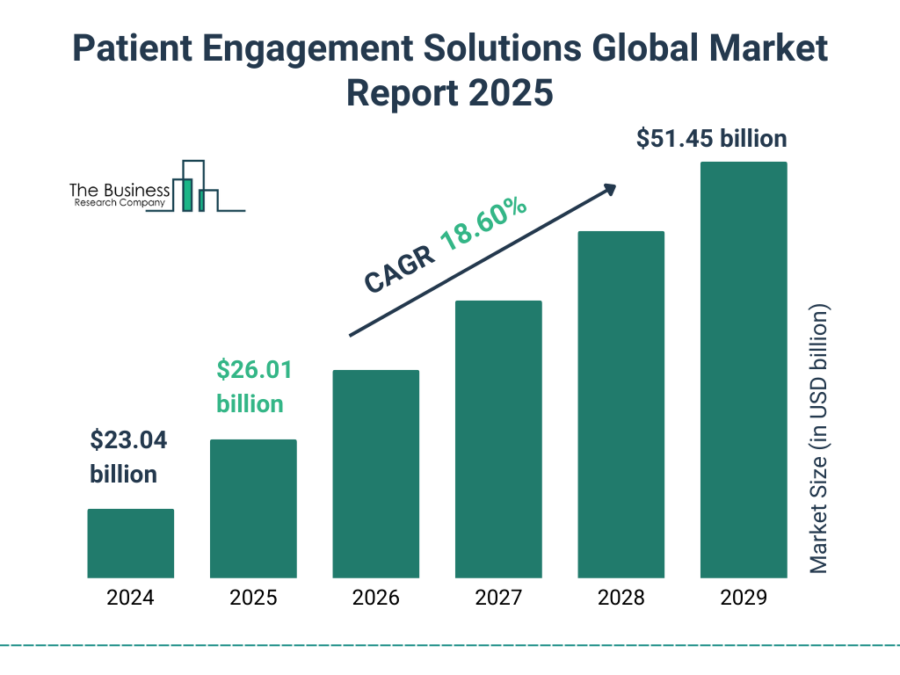
Credit: The Business Research Company
Siara Health provides Patient Education for Surgeries
Australian startup Siara Health works on digital tools to support patient education and engagement. The startup eliminates misinformation and health anxiety in surgery patients by educating them about clinical procedures.
Its software delivers disease-specific information and reminders of key medical milestones of patients, featuring information from clinical teams. This way, the startup nurtures a rapport between the healthcare provider and patients.
Nilo Saude supports Patient Engagement & Management
Brazilian startup Nilo Saude makes software to facilitate patient relationship management and care delivery. It increases patients’ access and engagement via integrated omnichannel communication with clinicians.
This enables collaboration in care delivery for better clinical outcomes. Doctors connect with patients before, during, and after consultations or procedures, thus building patient loyalty. Further, the startup’s software integrates data from other application programming interfaces (APIs), creating a centralized source of information to ensure seamless continuity of patient care.
8. Home Health Care
Home health care is a rapidly emerging trend that allows patients to receive medical assistance in the comfort of their homes. Telehealth technologies, such as video conferencing and wearable monitoring devices, allow patients to receive remote support from healthcare providers. This is especially helpful for patients who have limited mobility or live in remote areas.
Smart home devices like voice assistants also help patients with mobility issues control their home environment easily and reduce the risk of accidents. Moreover, it is a more economical option compared to hospitalization as it does not demand equivalent resources in terms of staff and facilities.
The home care services market is set to reach USD 1614.1 billion by 2035, at a CAGR of 10.5% from 2025 to 2035. Additionally, available employment in the home health care field is projected to grow 21% from 2023 to 2033.
Axle Health optimizes In-home Health Care
US-based startup Axle Health develops healthcare workforce management software to operationalize in-home healthcare services. The software simplifies appointment booking, home-based blood draws and injections, patient communication, and other telehealth services.
It also offers real-time location tracking and alerts for visits that require urgent attention. This ensures that patients start their treatment quicker, resulting in increased likelihood of successful treatment.
MedPath designs Home Health Care Software
Canadian startup MedPath develops software for home healthcare provider management. It aids call scheduling, GPS tracking, route planning, and more to better manage house-call physicians. The software also tracks and schedules appointments of HCPs with patients for automated practice management.
Additionally, the software supports medical device management, automated invoicing, and treatment plan management. MedPath facilitates patient care and optimizes workflows, reducing administrative tasks for doctors to focus on patient care.
9. Digital Biomarkers
Digital tools such as wearable devices, mobile apps, and other digital platforms collect and analyze quantifiable physiological, behavioral, or biological measures, known as digital biomarkers. They are often non-invasive, thereby reducing the need for invasive procedures and improving patient comfort. One of their key advantages is the ability to provide continuous, real-time monitoring of an individual’s health status.
This allows healthcare professionals to detect early signs of disease or other health conditions and provide timely interventions to prevent complications. Moreover, digital biomarkers are useful in monitoring the effectiveness of medical treatments by tracking changes in the patient after medication or medical procedures.
The global digital biomarkers market is set to reach USD 12.52 billion by 2029 growing at a CAGR of 26.1%.
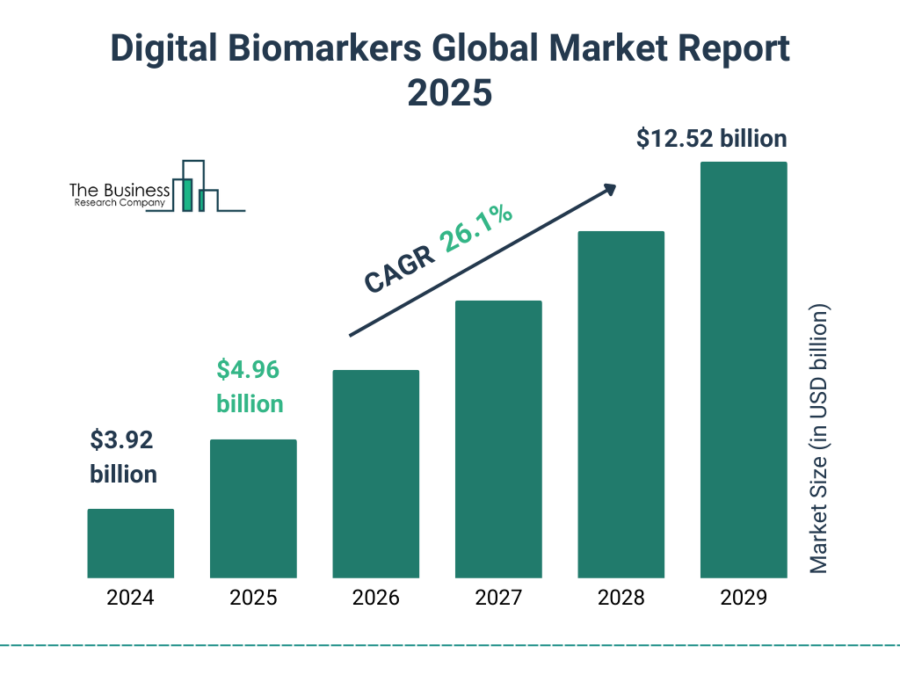
Credit: The Business Research Company
IMVARIA Digital develops a Biomarker Platform
US-based startup IMVARIA Digital develops software as a medical device (SaMD) tools to enable non-invasive diagnostics. The startup’s cloud platform, Digital Biomarker Lab, applies machine learning and data science to medical data, like diagnostic images and lab reports, to analyze cases and create reports.
This empowers physicians to make informed clinical assessment decisions. Its digital biomarker, Fibresolve, leverages AI to analyze computed tomography (CT) imaging of lungs for the assessment of interstitial lung disease (ILD) and idiopathic pulmonary fibrosis (IPF). This enables clinicians to make accurate diagnoses at earlier stages of the disease while reducing the need for invasive biopsy testing.
Lapsi Health develops Auscultation Technology
Dutch startup Lapsi Health creates biomarkers based on auscultation or sound technology. It utilizes sounds acquired from stethoscopes to diagnose different types of diseases. For example, a physician uses a stethoscope to listen to the sounds of the lungs, heart, or gastrointestinal tract to detect any potential issues or abnormalities that require further investigation.
The startup’s technology enables a non-invasive treatment option to screen diseases. It finds applications in telemedicine, DTx, remote patient monitoring, and the development of medical devices.
10. Mobile Health
Mobile health technology, also known as mHealth, involves the use of mobile apps, text messaging, and other forms of digital communication to provide healthcare services. Such solutions also allow healthcare professionals to monitor patient health status and educate patients about health-related issues. There are health and fitness apps that track patients’ physical activity, monitor their diet, and deliver personalized health recommendations.
This makes mHealth more convenient and easier to use than traditional healthcare services. It also empowers patients to take an active role in their healthcare, leading to improved health outcomes. Moreover, mHealth enables healthcare providers to communicate more effectively with their patients, improving the quality of care.
exakt health offers App-based Physiotherapy
German startup exakt health creates a mobile app to treat sports injuries. It combines current research with clinical experience to design personalized treatment plans for running injuries. Apart from injury treatment plans, the app offers injury prevention instructions with guidance tutorials.
This makes it more effective for users when dealing with running-specific injuries. The app also offers personalized training that adapts to the recovery progress of the user. This way, the startup offers a convenient solution for faster recovery and injury prevention for new and experienced runners.
Brea Health improves Breast Cancer Wellness
German startup Brea Health develops a mobile app for the personalized care of breast cancer patients. It supports patients before, during, and after treatment by boosting their health literacy, well-being, and self-tracking. The app leverages AI to record and analyze relevant symptoms, thereby offering a better understanding of the illness. It also features check-ups, coaching, mobilization exercises, and targeted information campaigns to enable holistic patient management, enabling cancer patients to better cope better after therapy.
Discover all Digital Health Trends, Technologies & Startups
Digital health is disrupting healthcare by leveraging technology to improve access, quality, and efficiency of healthcare services. The industry witnesses the proliferation of smartphones, wearables, and other mobile devices, to monitor health and receive medical advice. The increasing need for convenience and proactive healthcare increases the number of startups focusing on remote patient monitoring, digital therapeutics, and home healthcare solutions.
Startups also ensure patient adherence to medication or treatment by developing educational and engaging solutions. The Digital Health Trends & Startups outlined in this report only scratch the surface of trends that we identified during our data-driven innovation & startup scouting process. Identifying new opportunities & emerging technologies to implement into your business goes a long way in gaining a competitive advantage.

